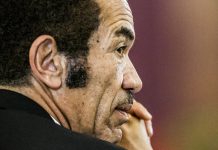By Shinovene Immanuel | 2 July 2019
MANY children of Namibia’s political elite have joined the scramble for lucrative State concessions and contracts that have turned them into overnight multi-millionaires.
The preferential treatment afforded the children referred to as the country’s ‘golden children’ has prompted complaints of nepotism.
These beneficiaries include the daughter of President Hifikepunye Pohamba, Kaupumhote Pohamba.
Some of these globe-trotting youngsters are reported to have promised potential foreign investors to facilitate meetings for them with Namibia’s top politicians in exchange for business partnerships. This would open more business opportunities for the foreigners.
Some have received contracts from ministries where their parents worked or exercise authority.
The Institute for Public Policy Research (IPPR) has repeatedly called for laws to curb the perceptions that the elite and their families are enriching themselves at the expense of the majority of the population.
Namibia is struggling with a high youth unemployment rate, given as 56% by the Namibia Statistics Agency for those between 15 and 19, and 49% for those between 20 and 24 years.
The preferential treatment also applies to educational opportunities. In 2009, the Chinese government secretly awarded scholarships to study in China to the offspring of nine top officials, including one of Pohamba’s daughters, Ndapanda.
This raised a furore among ordinary Namibians and the Anti-Corruption Commission admitted this year that China had blocked its investigation into how the scholarships were awarded.
Excellence or enrichment?
The IPPR has called for tightening of controls over declarations of interest by public officials, to reduce the risk of State resources being dished out to relatives of top officials.
It expressed concern at the lack of effective legislation and regulatory systems requiring disclosures.
Al Jazeera quoted IPPR director, Graham Hopwood, last month as saying State resources are seen by the politically connected as being up for grabs, rather than being there to be allocated through a fair and competitive process.
“Namibia is at a tipping point; endemic corruption is inevitable if stern action is not taken in the near future,” Hopwood said.
Some consider the emergence of a local elite as evidence of economic success and black excellence, while others object that that resources should be more evenly distributed.
Social commentator Henning Melber said Namibia is increasing displaying the tendencies of a predatory elite which “unashamedly exploits the access to what should be considered as public goods for their own benefit”.
“A culture of appropriation in the name of black economic empowerment is abused to further privilege those who already have more than enough,” he said.
“It is greed in practice, which contradicts the basic notion of good governance, since those who are supposed to serve public interest, serve their own interests,” Melber added.
Former President Sam Nujoma promised in 1985 that “when Namibia is independent, its riches will be distributed for the good of all its citizens”. That promise remains a pipe dream as Namibia is considered one of the top unequal nations in the world.
Ironically the spokesperson for the Swapo Party Youth League Job Amupanda is also worried by elite enrichment. “They (the elite) are a danger to the future of mother Africa,” he said.
The children of the elite who are sitting pretty include:
Shafa Kaulinge
The son of home affairs minister Pendukeni Iivula-Ithana, Kaulinge has business interests in petroleum.
His company, Amis Energy, is a partner of Pan African Oil which holds three lucrative oil exploration licences in Namibia. Kaulinge is the country manager of Pan African Oil.
He is also a director of Mack Fishing, a joint venture set up by the government to boost local participation in the fishing sector. He is also a director of GPT-TransNamib Concrete Sleepers, a subsidiary of the rail parastatal, TransNamib, that was launched in 2011 at a cost of N$50 million.
King Frans Indongo
The son of former politician-turned-business bigwig Frans Indongo, King Frans holds two petroleum licences through Leopard Investments, which is 85% owned by a firm in the British Virgin Islands tax haven.
He is the executive vice-president of his father’s business empire. King Frans reportedly promised investors on a Chinese social network that prospective business partners would meet President Pohamba, ex-president Nujoma and ex-minister of mines Erkki Nghimtina.
His father, a former minister in the Owambo administration under the colonial dispensation, was a political leader from 1970 to 1980, when he became a full-time businessman. Indongo senior is now Swapo darling.
Indongo junior rejected claims that he is being favoured. “My businesses have nothing to do with the fact that my father is a multi-billionaire or well connected,” he said. “I am a professional investor who has invested my hard-earned money.”.
Phillipine Angula
Phillipine is the daughter of Helmut Angula, who served in five Cabinet portfolios. She is a director of two of his companies, Dinamo Diamonds and Eco Namibia. Dinamo receives diamonds on discount from a government and De Beers owned company. Eco Namibia has 10 oil prospecting rights in Namibian. Phillipine did not respond to questions sent to her.
Simasiku Kamwi
Simasiku, the son of the health minister Richard Kamwi, co-owns Likoze Investments which received a N$35 million agriculture ministry construction contract to install a rural water pipeline in 2013.
Weekly newspaper Windhoek Observer reported that Simasiku was exempted from paying a N$400 000 fine that is normally charged to companies that fail to complete projects on time and was given special treatment after he wrote to government explaining why the project was not finished. “I was not favoured – full stop,” Simasiku told the Mail and Guardian newspaper this week.
Kaupumhote Pohamba
Kaupomhote (26), President Pohamba’s daughter, bagged a controversial N$16,4 million housing contract from the National Housing Enterprise last year. Her firm Kata Investments was awarded the contract 12 months after she formed it. Her company entered a joint venture with Chinese partners and are now short-listed for a N$400 million road tender.
Kaupumhote’s business partner, Taschiona !Gawaxab, was reported as saying they competed in a male-dominated industry and that the tender would be the first of many.
Taschiona’s father is Johannes !Gawaxab, the Old Mutual Africa managing director whom president Pohamba “admires”. The presidency said Pohamba had no influence on the tender and that Pohamba’s children are grown-ups who make their own decisions about who they do business with.
Sam Ekandjo
Sam, the son of minister of youth Jerry Ekandjo, clinched a mass housing contract worth N$42 million this year through his two-year-old company Oruhapo Property Solutions. Jerry Ekandjo served as a minister of housing until December 2012.
In June this year Jerry rejected suggestions that his previous portfolio might have influenced the awarding of the contract to his son. Sam told M&G that children of leaders are individuals on their own right and should be judged on their merits and not those of their parents.
“One deserves to be criticised if the manner one gets a tender is unfair or corrupt,” he said. “There are calls for Namibians especially the youth to be job creators and risk-takers … if some children of leaders have taken up this call and decided to be active individuals in society their initiative should be welcomed.
“The Constitution is clear — everyone is equal. This means children of leaders have every right to partake in any sector, like all other members of society”
Frans Mushimba
Mushimba is the son of the late empowerment mogul Aaron Mushimba, the brother-in-law of former President Nujoma. Frans has a petroleum prospecting licence though his company Indigenous Energy.
Older children
Older children of Namibia’s independence politicians also accumulated wealth, including the sons of Nujoma.
In 2009, Nujoma’s oldest son, Utoni declared to parliament business interests in over 14 companies since 1996. These are in sectors such as diamonds and fishing where the State has a powerful influence. Some of the companies are dormant now.
Nujoma’s youngest son, Zacky, a geologist, is into exploration for diamonds and uranium where State licences are required.
Businessman Sadike Nepela is the son of Lucas Nepela, one of Swapo founders. Besides receiving diamonds at a discount from a government co-owned company, he also owns Etale Fishing which received a horse mackerel fishing quota last year.
He agreed in an interview with amaBhugane in September that the fisheries ministry had allocated the quota in error because he did not have the required licence or processing facilities.
He later sold the quota for about N$40 million, justifying the transaction by saying that the sale of the quota had enabled him to employ more people.
*Shinovene Immanuel was an intern at the Mail & Guardian investigative unit amaBhugane in South Africa. This article is part three of a series of investigations into the elite’s grip on Namibian resources.






